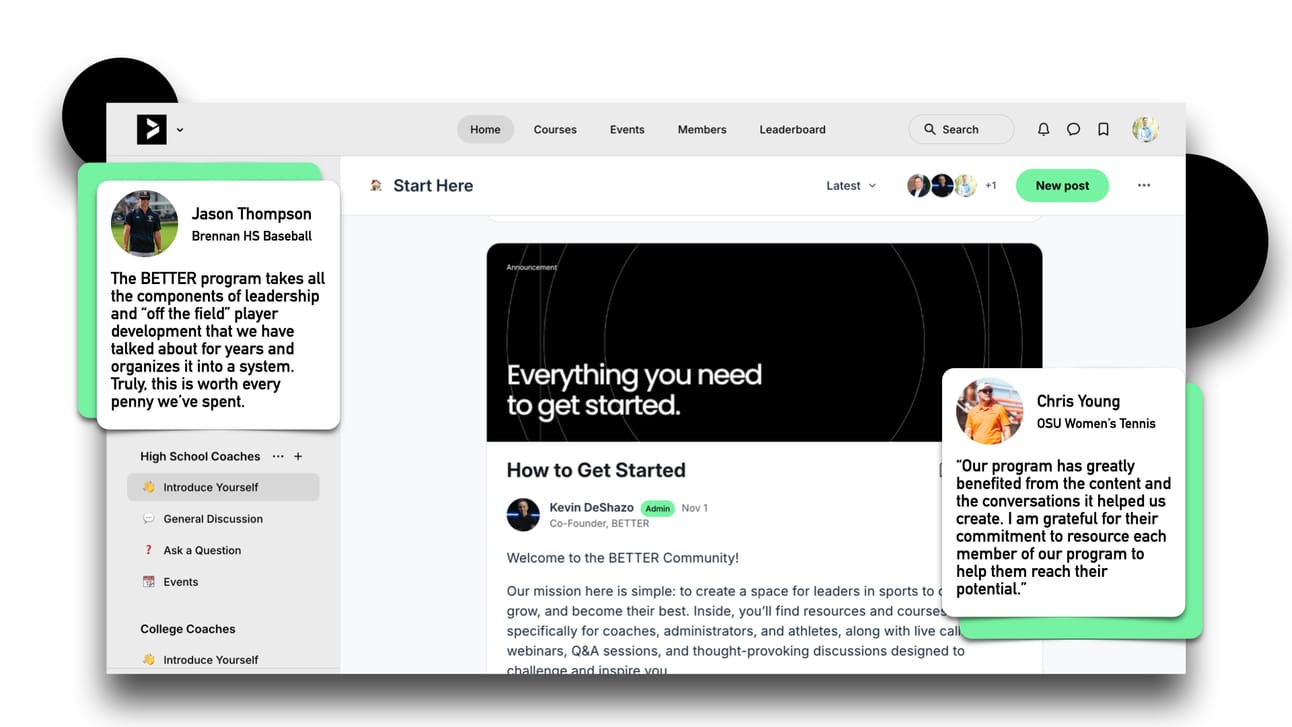
⏳ Read Time: 3 min
Last week’s newsletter was our most opened, most read, and most shared BETTER newsletter.
We don’t say it enough. But thanks for being here.
Let’s raise the level of leadership in Athletics, together.
📌 What’s inside:
⚾ The comeback: How the Red Sox rewrote history one game at a time
📊 The research: Why small wins build resilience and momentum
🛠 Five ways to create small wins for your team this week
🔗 From Adversity to Action

Last week, we talked about the Pit of Despair—that inevitable moment when adversity hits and togetherness gets tested. The lesson: adversity isn’t optional, but preparation is.
This week, we’re taking the next step. How do you actually climb out of the pit once you’re in it? The answer isn’t a big speech or a magic moment. It’s stacking small wins until momentum shifts.
📖 Anecdote: The Red Sox Comeback
For 86 years, the Boston Red Sox lived in the Curse of the Bambino. It might possibly be the largest Pit of Despair that any sports franchise has been in.
So when the Yankees went up 3–0 in the 2004 ALCS, the script felt written. No team had ever come back from that deficit. For Boston, it looked like the latest, most painful chapter in a century of despair.
But manager Terry Francona didn’t dwell on the curse or history. He didn’t try to inspire his players with talk of winning four straight. Instead, he narrowed their focus to the smallest possible target:
“It wasn’t ‘let’s win 4’, it was ‘let’s win tonight.’”
Let’s win tonight.
And really, that’s all they could do. What other options did they have but focus on the game in front of them? 86 years of history weighing down on their shoulders.
That shift in focus turned the impossible into the achievable. The Red Sox clawed back one inning and one at-bat at a time. Four games later, they completed the most remarkable comeback in baseball history — and finally broke the curse with a World Series title.
📊 Research Insight: The Power of Progress
Organizational psychologists Teresa Amabile and Steven Kramer studied daily progress across 12,000 work journal entries. They found one consistent theme: small wins were the single most powerful driver of motivation and engagement.
Why? Because progress, even tiny progress, gives people hope.
This phenomenon is now known as The Progress Principle and has led to change in organizational practice at companies like Google, institutions like Harvard, and dozens of Fortune-500 companies.
For teams, this means the fastest way out of despair isn’t one giant breakthrough. It’s stringing together achievable steps that restore confidence and belief.
🛠️ Putting It All Together:
🛠 Five Ways Leaders Can Create Small Wins
Define Today’s Win Condition
Start by naming one specific thing that would make today a win for you as a leader. Maybe it’s “finalize the staffing plan” or “ask three intentional questions in practice.” If you can’t name the win, your people won’t either.
Make Progress Visible
Track and show small wins so they don’t get lost in the grind. That might be a whiteboard of key milestones in the office or a scoreboard of daily improvements in practice. If progress is invisible, it won’t motivate.
Celebrate Process, Not Just Outcome
Applaud when the right habits are executed, whether it’s a staff member running a clean game-day setup or an athlete executing the defensive rotation. When you model celebrating progress, your team learns to value it too.
Chunk Big Goals Into Bite-Sized Milestones
Take the overwhelming goal and break it down. For an AD, “launch a capital project” becomes “secure three donor meetings this week.” For a coach, “win the conference” becomes “execute this week’s scouting plan.” Big visions move forward through small, tangible steps.
Model Progress-Oriented Leadership
Share your own small wins out loud: “I cleared a roadblock with compliance today,” or “I handled a tough locker room moment better than last week.” When leaders model growth through small wins, they normalize progress as the real driver of excellence.
🏁 Conclusion: It’s In the Prep
Considerable adversity makes leaders want to give big speeches. But most of the time, what your team really needs is small, steady proof that they’re moving forward.
Stack enough small wins, and before long, you’re out of the pit and back on track.
🧱 Webinar on Handling Adversity
Last week, Kevin and Seth led a Webinar on Handling Adversity to all of our coaches in our Culture Playbook Community.
If you want to see that Webinar, reply to this email and we’d be happy to share it with you.

It’s packed with short, practical tools and team exercises that take your values off the wall and bring them to life.
The same tools are used by programs like Mississippi State, Florida State, and even teams at Microsoft and Google.
🛠️ Want to win more? Know Yourself First.
Just last week, nearly 60 leaders signed up for our 5-day leadership course based on your Voice!

It will be sent to your inbox starting the Monday after you take the assessment and run for that week.
The assessment takes 10-15 minutes. Take it below.
